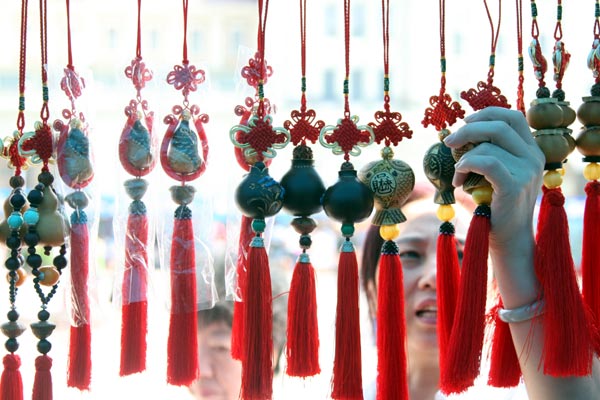
A woman selects souvenirs at a scenic spot in Changsha, Hunan province. [Photo/China Daily]
The tourism boom brought on by Chinese outbound travelers during the recent Tomb Sweeping Day holiday has pushed hotel room reservations to more than 90 percent in Japan where tourists rush to see the cherry blossom during April.
The news follows Chinese travelers' frenzy in purchasing electronic toilet seats and electric rice cookers from Japan during Spring Festival this year.
Heavy spending overseas by wealthy Chinese tourists has resulted in debates among Chinese tourism officials and industry players on how to stimulate the domestic tourism sector.
Shao Qiwei, former director of the China National Tourism Administration, and a member of the National Committee of the Chinese People's Political Consultative Conference, said during the top political advisory body's annual session in March that it is vital to enhance the development of travel equipment manufacturing in the country, and called for the integration of the tourism and manufacturing industries in order to develop tourism equipment that meets market needs and is technologically advanced.
It is estimated that by 2020, Chinese people are expected to travel 4.5 times per capita on average annually, or 6 billion person times with a total spend of 5.5 trillion yuan ($887 billion).
Peng Decheng, director of the administration's department of planning and finance, said that shopping accounts for 30 percent of Chinese tourists' domestic spending, while the level is between 50 and 60 percent in developed economies.
Peng said that it is important to enhance the country's tourism product branding, roll out a group of characteristic products and souvenirs for tourists, and encourage farmers to develop village and agriculture-related products.
Domestic tourism grew 10 percent in 2014 with 3.6 billion travels made and inbound tourism fell 1 percent with 128 million visits. There were more than 100 million outbound visits by Chinese tourists, according to official data.
The massive tourism market requires better services and quality facilities, creating opportunities for tourism equipment manufacturers to capitalize on it, from a wide range of sectors such as personal luggage and recreational vehicles.
Previous Page12Next PagePrevious Page12Next Page